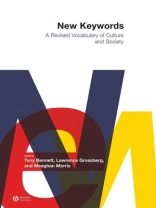Over 25 years ago, Raymond Williams‘ Keywords: A
Vocabulary of Culture and Society set the standard for how we
understand and use the language of culture and society. Now, three
luminaries in the field of cultural studies have assembled a volume
that builds on and updates Williams‘ classic, reflecting the
transformation in culture and society since its publication. New
Keywords: A Revised Vocabulary of Culture and Society is a
state-of-the-art reference for students, teachers and culture
vultures everywhere.
* * Assembles a stellar team of internationally renowned and
interdisciplinary social thinkers and theorists
* * Showcases 142 signed entries – from art,
commodity, and fundamentalism to youth,
utopia, the virtual, and the West
– that capture the practices, institutions, and debates of
contemporary society
* * Builds on and updates Raymond Williams’s classic
Keywords: A Vocabulary of Culture and Society, by reflecting the
transformation in culture and society over the last 25 years
* * Includes a bibliographic resource to guide research and
cross-referencing
* * The book is supported by a website:
www.blackwellpublishing.com/newkeywords.
Inhaltsverzeichnis
Acknowledgements
Abbreviations.
Introduction
A.
Aesthetics.
Alternative.
Art.
Audience
B.
Behaviour.
Biology.
Body.
Bureaucracy
C.
Canon.
Capitalism.
Celebrity.
Citizenship.
City.
Civilization.
Class.
Colonialism.
Commodity.
Communication.
Community.
Conservatism.
Consumption.
Copy.
Country.
Culture
D.
Deconstruction.
Democracy.
Desire.
Development.
Diaspora Difference.
Disability.
Discipline.
Discourse
E.
Economy.
Education.
Elite.
Emotion.
Empirical.
Environment/ecology.
Equality.
Ethnicity.
Everyday.
Evolution.
Experience
F.
Family.
Fashion.
Feminism.
Fetish.
Freedom.
Fundamentalism
G.
Gay and Lesbian.
Gender.
Generation.
Gene/genetic.
Globalization.
Government
H.
Heritage.
History.
Holocaust.
Home.
Human.
Human Rights
I.
Ideology.
Identity.
Image.
Indigenous.
Individual.
Industry.
Information.
Intellectual
J.
Justice
K.
Knowledge.
L.
Liberalism
M.
Management.
Marginal.
Market.
Mass.
Materialism.
Media.
Memory.
Mobility.
Modern.
Movements.
Multiculturalism
N.
Narrative.
Nation.
Nature.
Network.
Normal
O.
Objectivity.
Orientalism.
Other
P.
Participation.
Person.
Place.
Policy.
Political correctness.
Popular.
Pornography.
Postcolonialism.
Postmodernism.
Poverty.
Power.
Pragmatism.
Private.
Public
Q.
Queer
R.
Race.
Radical.
Reason.
Reform/revolution.
Relativism.
Representation.
Resistance.
Risk
S.
Science.
Self.
Sexuality.
Sign.
Socialism.
Society.
Sovereignty.
Space.
Spectacle.
State
T.
Taste.
Technology.
Text.
Theory.
Therapy.
Time.
Tolerance.
Tourism
U.
Unconscious.
Utopia
V.
Value.
Virtual
W.
Welfare.
West, the.
Work.
Writing
Y.
Youth.
Notes on editors and contributors.
References
Über den Autor
Lawrence Grossberg is Professor of Communication Studies at
University of North Carolina, Chapel Hill. He co-edited the seminal
volume Cultural Studies (l990) and is the author of We
Gotta Get Out of this Place (1992) and Bringing it All Back
Home (l997). He also co-authored Media-Making: Mass Media in
Popular Culture (with Ellen Wartella and D. Charles Whitney,
l998).
Tony Bennett is Professor of Sociology at the Open
University. He is the author of The Birth of the Museum:
History, Theory, Politics (l995) and Culture: A
Reformer’s Science (l998), and is co-editor of Culture
in Australia: Policies, Publics, and Programs (with David
Carter, 2001).
Meaghan Morris is Chair Professor of Cultural Studies at
Lingnan University. She is the author of The Pirate’s
Fiancée: Feminism, Reading, Postmodernism (1988),
Translation and Subjectivity (l997), and Too Soon Too
Late: History in Popular Culture (l998), and is co-editor (with
John Frow) of Australian Cultural Studies: A Reader
(l993).












